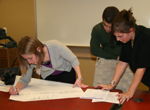|
|

|
Students engage in team work, address health care issues
|
MUSC
and Creating Collaborative Care (C3) had its fifth annual
Interprofessional Day on Jan. 8. Interprofessional (IP) Day was an
all-day event that involved all first and second year
students—approximately 1,150 students.
Second-year students began the day by attending a presentation by the
Amyotrophic Lateral Sclerosis (ALS) or Lou Gehrig’s disease team. Lotta
Granholm, Ph.D., DDS, professor and director for the Center on Aging,
provided remarks about the role of basic scientists in clinical and
translational research. Students then moved to small groups to work on
an interprofessional case study with students from various programs.
This year’s case study focused on alcohol awareness.
 First-year
occupational and physical therapy students Heidi Warren, Pierce Bruner
and Ashley Farina list stereotypes associated with their health
profession as part of an interprofessional activity. First-year
occupational and physical therapy students Heidi Warren, Pierce Bruner
and Ashley Farina list stereotypes associated with their health
profession as part of an interprofessional activity.
For the first time, first-year dental, nursing and medical students
began coursework in the inaugural Interprofessional Education (IPE)
core course, IP 710-Transforming Healthcare for the Future. In this
online course, students will explore the art and science of teamwork
and communication skills, cultural competency, ethical issues, health
care disparities, social determinants of health and evidence-based
medicine. The orientation and kickoff for the course was held at noon
on IP Day. Next year, all six colleges will be involved in this IPE
core course.
After the orientation, all first-year students attended a presentation
by Helen Haskell. Haskell spoke about her son, Lewis Blackman, who died
at MUSC in 2000 following a series of medical errors. She, and fellow
IP Day speaker, Chris Rees, director of Quality and Patient Safety at
the Medical University Hospital, described subsequent health care
system improvements enacted to prevent such errors in the future. These
include the Lewis Blackman Hospital Patient Safety Act (established in
2005) and the presence of rapid response teams in hospitals. South
Carolina is the only state with legislation mandating patient rights
during hospitalization. A national advocate for promoting patient
safety, Haskell’s remarks poignantly highlighted how health care
professionals need the humility to acknowledge when a patient needs
immediate attention and the courage to take action to address potential
errors.
First-year students were then split into small groups to work on an
interprofessional activity. This activity helped participants learn
about each others’ professions and addressed stereotypes targeted
toward health professionals.
Approximately 20 employees from all six colleges, as well as the
Division of Education and Student Life, and 45 faculty, staff and
student facilitators were involved in the day.
For information, visit the Creating Collaborative Care Web site at http://academicdepartments.musc.edu/c3/index.htm.
Friday, Jan. 15, 2010
|
|
|



